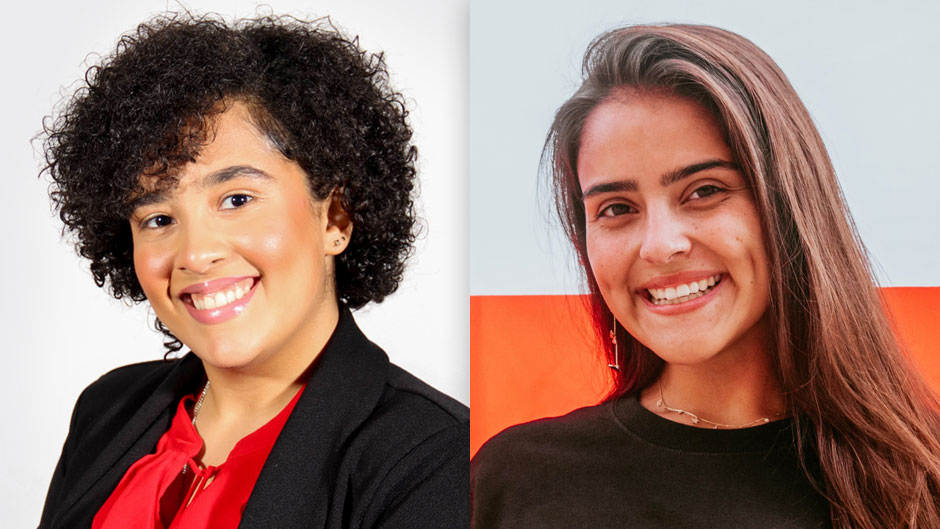Guided by businesswomen who have faced—and overcome—the challenges they expect to encounter, the first cohort of The Latina Project recently completed the five-week intensive coursework portion for the new program in the University of Miami Patti and Allan Herbert Business School.
“The speakers were all amazing and so inspirational and all of them were women, and many Hispanic—like me. I’m very grateful for that experience,” said Angelica Peralta, a senior majoring in public relations and minoring in entrepreneurship, and one of the 29 students in the cohort.
“Hearing these women’s stories and knowing that they were once students like me and to hear that they made it and that I can make it, too—that really boosted my confidence,” added Peralta, the incoming president of the University chapter of the Public Relations Student Society of America and selected as an awardee for the Hispanic Scholarship Fund at the Entrepreneurship Summit.
Fernanda Salas Hormazábal, a sophomore majoring in marketing and pursuing a minor in studio art/graphic design, also participated and highlighted the unique personality of the instruction.
“There were so many little lessons that I took to heart from the presenters, and I definitely feel more confident now,” she said.
Born in Miami, Salas Hormazábal moved with her family to Chile when she was just a week old. She lived and was schooled there until she started at the University. She was very involved in Hispanic Heritage Month activities when a friend told her about the project, noting that she would be an ideal candidate.
“I joined The Latina Project because I wanted mentorship. I had just started at the business school and was from a different major and feeling a little lost, but now I have more direction,” she said.
“All except one of the speakers were women and they gave us a perspective that you don’t ordinarily get—recognizing that it’s oftentimes harder for a woman if they’re negotiating with a man and that we’re sometimes treated as less and so you have to go in there knowing what you want and having the confidence to ask for what you want,” Salas Hormazábal added.
The difficulties that Salas Hormazabal identified are specifically those that International Women’s Day, celebrated on March 8, strives to address. The global celebration, themed this year “BreaktheBias,” focuses on advocating for a world that is diverse, equitable, and inclusive.
The Latina Project was launched in mid-October, with selections announced in January and the first cohort completing the instruction phase of the program in late February. The up-and-coming entrepreneurs are all now provided at least one mentor, a businesswoman with experience in a facet of the industry they are most interested in.
“These young women are more capable now and ready and eager to make substantial contributions to society because we have prepared them,” said Susy Alvarez-Diaz, senior lecturer of entrepreneurship and The Latina Project program director.
Participants started by creating a personal brand and learning networking skills and then branched into negotiating, interviewing, understanding financial statements, raising capital, and creating career mapping strategies and goals. They attended instruction every Friday and worked in teams and individually to demonstrate their learning, whether geared toward a career in corporate or launching a startup.
Alvarez-Diaz, a double alumna, emphasized that the modules were taught by top women faculty in the business school and that a strong cadre of female professionals together with faculty provided the critical mentoring component of the project.
“Most of these young women in the program don’t have the connections needed and we want to share with them the work we’ve already done and the connections we’ve made,” she said.
Participants range from first year to graduate students and hail from many different academic areas.
“First years want contacts and to get internships, while a grad student is looking for employment,” Alvarez-Diaz explained. “We customize it based on where the woman is in her career and what she’s looking to get out of the program trajectory—that’s the beauty of it.”
Alvarez-Diaz noted that The Latina Project donors, Ana Teresa Rodriguez and Luis Garcia, encouraged the school to follow the model of “Girls Who Invest,” launched at the University of Pennsylvania in 2015.
Seema Hingorani, that program’s founder and chair, was eager to share best practices and to provide whatever mentoring was requested.
“She really highlighted how important it is, especially for women, to acquire hard skills in business, for anything in STEM, and to have same-gender role models to guide them through,” Alvarez-Diaz said. “It’s amazing to have them as our mentor and to ensure that we have success in our program.”
Alvarez-Diaz pointed out that she and the other faculty and professional mentors are fortunate to be “on the other side” from what the students are facing. In reflecting on their own experience, they hope to ease the burden and reduce the challenges these new entrepreneurs face.
“We worked really hard and did our best to get noticed, but with no contacts many of us bounced around,” she added. “Imagine if we’d had someone who was our mentor, someone who told us to interview for this or that job, that this is what you need to do to level up, instead of letting it organically happen,” she continued. “We want to help these young women by lending our experience and sharing the work, efforts, and the connections that we’ve made.”
Ileana Musa, who is a managing director at Morgan Stanley and one of the mentors for the program, concurred, “We want them to be able to get there in half the time that it took us.”

